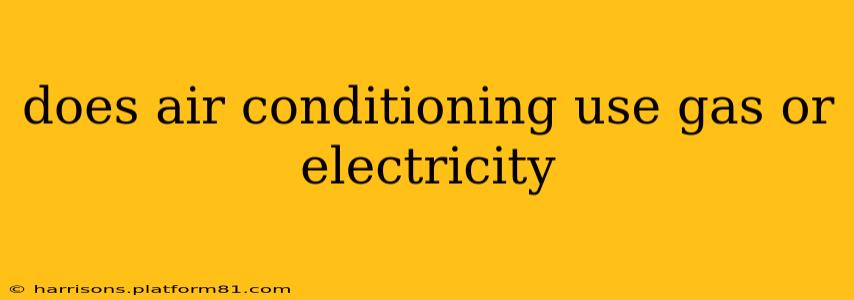Air conditioning systems, the lifesavers of hot summer days, can utilize either electricity or gas as their primary power source. However, the vast majority of residential and commercial air conditioners rely on electricity. While gas-powered air conditioning exists, it's significantly less common, especially in homes. Let's delve deeper into each type and explore the differences.
How Does Electric Air Conditioning Work?
Electric air conditioners are the most prevalent type. They function by using electricity to power a compressor, which is the heart of the system. This compressor circulates a refrigerant, a special fluid that absorbs heat from the indoor air and releases it outside. The process is essentially a heat pump, moving heat from one location to another. This cycle of compression, condensation, expansion, and evaporation cools the indoor air efficiently.
The electricity powers not only the compressor but also the fans that circulate the cooled air throughout your home or building. Different types of electric AC units exist, including:
- Central air conditioning: This system cools an entire building from a single unit located outside.
- Window air conditioners: These smaller units are installed directly in a window.
- Portable air conditioners: These units are freestanding and can be moved from room to room.
- Ductless mini-splits: These systems offer zoned cooling, allowing you to control the temperature in individual rooms.
What About Gas Air Conditioning?
Gas air conditioning systems are less common but still exist. These systems use natural gas or propane to power a heat pump. Instead of electricity directly driving the compressor, the gas provides the energy to run the system. The refrigerant still does the work of absorbing and releasing heat, but the initial energy source is a gas-fired furnace or boiler.
Gas air conditioning systems are sometimes preferred in areas where electricity costs are high or where natural gas is readily available and inexpensive. However, they typically require more extensive installation and maintenance.
What are the Pros and Cons of Each System?
Electric Air Conditioning:
Pros:
- Widely available: Electric AC units are readily available and easier to install.
- Lower initial cost: Typically less expensive upfront than gas-powered systems.
- Quieter operation: Generally quieter than gas-powered systems.
Cons:
- Higher running costs (in some areas): Electricity prices can be high, making operation expensive, depending on your location and energy rates.
- Dependence on electricity: Power outages will render the system useless.
Gas Air Conditioning:
Pros:
- Potentially lower operating costs (in specific areas): In regions with cheap natural gas, operational costs can be lower.
- Less reliant on electricity: Can still provide cooling during power outages if coupled with a backup generator.
Cons:
- Higher initial cost: Installation costs are generally higher.
- More complex maintenance: Requires more specialized maintenance.
- Potential for higher emissions: Depending on the gas source and efficiency of the system, gas AC can have higher carbon emissions.
How Much Does It Cost to Run an Air Conditioner?
The cost to run an air conditioner varies widely based on several factors including:
- Size of the unit: Larger units consume more energy.
- Energy efficiency rating (SEER): A higher SEER rating indicates greater energy efficiency.
- Climate: Hotter climates require more cooling, increasing energy usage.
- Electricity or gas prices: The cost of your energy source directly impacts your running costs.
- Usage: The amount of time your AC runs daily or weekly significantly affects the total cost.
To get a precise estimate of your running costs, you should consult your energy provider and consider a professional energy audit of your home.
Which Type of Air Conditioning Is Best for Me?
The best type of air conditioning for you depends on several factors, including your budget, local energy costs, environmental concerns, and the climate you live in. Weighing the pros and cons of each system and considering the local energy landscape will help you make the most informed decision. Consulting with a qualified HVAC professional is highly recommended before making a purchase or installation.
Is it possible to have a hybrid gas and electric AC system?
While less common than purely electric or gas systems, hybrid systems exist. These typically involve a heat pump that can utilize both electricity and gas as heat sources. The choice between the energy sources might be automated based on pricing or availability. However, it's essential to understand that these systems are often more complex and require specialized installation and maintenance.
Does air conditioning use a lot of electricity?
Yes, air conditioning systems can consume significant amounts of electricity, particularly during periods of intense heat. However, modern, energy-efficient units (with high SEER ratings) are designed to minimize energy consumption. Regular maintenance, proper insulation, and strategic use can significantly reduce your energy usage.
